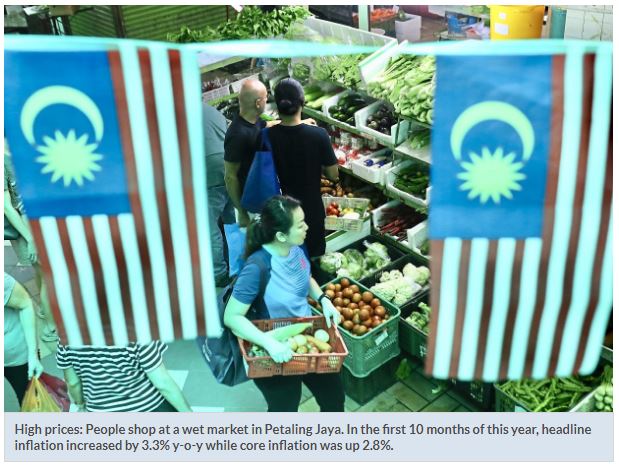Malaysia: Will high inflation go away in 2023?
WHAT goes up must come down.
Broadly, the market expects global inflation levels will be much lower in 2023, as higher interest rates cool consumer demand and tame inflation amid increasing risks of economic recession in advanced economies.
The unacceptable and uncomfortable levels of inflation top the list of most worrisome issue confronted by governments, the public and central bankers in 2022.
Soaring inflation compelled policymakers to implement anti-inflation and price stabilisation measures to soften the blow of inflation on the public.
Inflation and rising cost of living have eroded the spending power of the low and middle-income households, leaving them with lower net disposable income.
Controlling inflation (price stability) is one of the mandates of central banks, forcing most central banks to raise interest rates aggressively to take off price pressures from both supply shocks and demand pressures, as well as to anchor inflation expectations.
Robust pent-up demand, reinforced by a strong recovery in the labour market and improved in wage growth, must be tamed.
Recent inflation data suggest that consumer and producer prices have started to fall from their peak levels.
Inflation rate in the United States has slowed for four months in a row, from 9.1% year-on-year (y-o-y) in June 2022 to 7.7% in October, while that in eurozone has eased to 10% in November from a record high of 10.6% in October.
There are reasons for us to think that inflation is less a cause of concern in 2023.
Food, commodity and energy prices are cooling off from their peak levels, while the supply disruptions and labour market pressures are subsiding too.
Combined with the lagged effects of global central banks’ interest rate hikes to cool off demand, global inflation rates will likely cool throughout 2023. But the cool-down period will be long and slow.
Considering that the pace of retreat may be slow throughout the year, central banks could still continue with smaller rate of interest rate increases and will likely hold the interest rate levels longer throughout 2023.
But will China’s reopening lower inflation expectations? China’s rise in demand will help to firm up energy and commodity prices. In China’s domestic market, the presence of slack capacity can be restored to meet revived consumer demand.
While there could be supply disruptions due to the workers’ infection, over time, the smoothening of supply chains as well as follow-through demand and continuous supply would help to ease global inflation pressures.
How about Malaysia’s inflation trajectory in 2023? After peaking at 4.5% y-o-y in the third quarter (3Q) of 2022, headline inflation moderated for the second straight month to 4% in October – primarily due to the “electricity component” base effects, non-subsidised fuel and accommodation services.
In the first 10 months of 2022, headline inflation increased by 3.3% y-o-y while core inflation was up 2.8%.
Prices of food and non-alcoholic beverages continued to increase by between 6.8% and 7.2% during the July-October period of 2022.
This is despite the price controls and subsidies on eggs, chicken as well as cooking oil used in the preparation of food. Similarly, electricity tariffs are also heavily subsidised.
Food prices hit low-income households hardest. The Bottom 40 group spent 36.8% of their total household expenditure on food items, including restaurants and hotels.
Amid the softening crude oil and commodity prices, we expect both headline and core inflation to remain tilted to the upside in 2023, subject to domestic policy measures on subsidies (fuel, food, cooking oil and electricity tariff).
The subsidised RON95 pump price is based on crude oil price between US$55 and US$60 (RM242 to RM264) per barrel.
We expect the government to gradually phase out subsidies, moving from blanket subsidies to targeted approach in 2023, to smoothen out the impact of inflationary pressure on households, plus cost pressure on businesses.
Domestic price pressures are inevitable as we expect potential changes to domestic policy measures to rationalise subsidies.
We estimate Malaysia’s headline inflation to increase by 2.5% to 3.3% in 2023 (estimated 3.5% in 2022). The projected consumer price index trajectory will be aided by the corresponding high-base effects in 2022.
A fall in the inflation rate does not mean that prices in restaurants, stores, supermarkets and shops will be going down. It just means that they will be going up slower than before.
Likewise, the higher cost of living isn’t going away anytime soon. The low and middle-income households will continue to be plagued by challenges of the rising cost of living as broad-based price increases squeeze their tight budget relative to income and wages.
There is no quick fix to the cost of living issue. The government can implement short-term relieve measures (such as price controls, subsidies, targeted cash handouts and input prices subsidy) to partially mitigate against inflation and the higher cost of living.
The long-term solutions are to increase supply of food, reduce the dependency on imported consumer durables, lower the cost of production and improve the distribution channels.
We have to work on improving households’ income through income security programme for targeted vulnerable households, enhance their employability and earning power through upskilling and reskilling and create better-paying employment opportunities.
Other measures include the implementation of productivity-linked and performance-driven wage system; and encourage employers to increase the compensation of employees (CE) based on productivity and performance.
Malaysia’s CE-to-gross domestic product ratio of 34.8% in 2021 was lower compared to many developed nations: Singapore (49.6%); Japan (56.1%); the United Kingdom (57.4%); the United States (58.2%); South Korea (58.5%); Australia (59.6%); and Germany (63.2%).
Lee Heng Guie is Socio-Economic Research Centre executive director. The views expressed here are the writer’s own.
Source: https://www.thestar.com.my/business/business-news/2022/12/15/will-high-inflation-go-away-in-2023


 Thailand
Thailand




